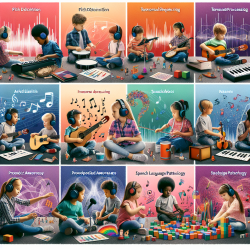As practitioners in the field of speech-language pathology, we continuously seek evidence-based methods to enhance our therapeutic approaches. A recent study titled A Preliminary Exploration of Pitch Discrimination, Temporal Sequencing, and Prosodic Awareness Skills of Children Who Participate in Different School-Based Music Curricula offers valuable insights into the potential benefits of music education on auditory processing skills in children. This blog aims to distill key findings from this research and provide actionable strategies for practitioners to improve their clinical outcomes.
Key Findings from the Study
The study investigated the auditory processing skills of children receiving different levels of music education. Specifically, it compared children who participated in daily, focused musical training to those who received a more generalized, weekly music class. The research focused on three primary areas:
- Pitch Discrimination: The ability to distinguish between different pitches.
- Temporal Sequencing: The ability to perceive and sequence sounds over time.
- Prosodic Awareness: The ability to understand the rhythmic and intonational aspects of speech.
The results were compelling:
- Children with daily, focused musical training showed significantly better pitch discrimination abilities.
- No significant differences were found in temporal sequencing or prosodic awareness, although trends suggested potential benefits from more focused training.
Implications for Practitioners
These findings suggest that incorporating music education into therapeutic practices could enhance specific auditory processing skills. Here are some practical strategies based on the study's outcomes:
1. Integrate Focused Pitch Training
Given the significant improvement in pitch discrimination, practitioners should consider incorporating focused pitch training exercises into their therapy sessions. Activities could include:
- Pitch matching games where children identify whether a note is higher or lower than a reference pitch.
- Using musical instruments to help children recognize and reproduce different pitches.
2. Explore Temporal Sequencing Activities
While the study did not find significant differences in temporal sequencing, the trends indicate potential benefits. Practitioners can incorporate activities that enhance temporal sequencing, such as:
- Clapping or tapping to the rhythm of a metronome.
- Sequencing tasks using musical notes or beats.
3. Enhance Prosodic Awareness
Although no significant differences were found in prosodic awareness, targeted activities could still be beneficial. Consider exercises that focus on:
- Identifying emotional intonation in speech.
- Practicing stress and intonation patterns through reading and speaking exercises.
Encouraging Further Research
The study highlights the need for further research, particularly with larger sample sizes and more diverse populations. Practitioners are encouraged to participate in or conduct additional studies to explore the long-term benefits of music education on auditory processing skills.
In conclusion, integrating focused musical training into speech-language therapy can significantly enhance pitch discrimination abilities in children. While further research is needed to confirm benefits in other areas, these preliminary findings offer a promising avenue for improving therapeutic outcomes.
To read the original research paper, please follow this link: A Preliminary Exploration of Pitch Discrimination, Temporal Sequencing, and Prosodic Awareness Skills of Children Who Participate in Different School-Based Music Curricula.










